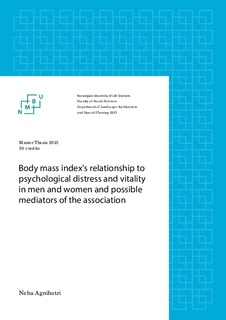| dc.description.abstract | Aims of the study: Mental health problems among those with a non-typical body weight have been increasingly researched the last couple of decades. The role of positive mental health in this relationship, however, has been less investigated. Studies indicate that positive and negative mental health are two independent constructs, and not simply the opposite of one another. The study aimed to investigate the relationship between body mass index (BMI) and negative and positive indicators of mental health, measured by psychological distress and vitality, respectively. Further, we explored gender differences and the mediating effect of physical activity, diet, sense of mastery and social support.
Methods: The data in this study was self-reported and obtained from the cross-sectional Level of Living surveys conducted in 2008 and 2012. The sample was nationally representative and the final sample for this study consisted of men and women aged 18-79 (N=7909). Psychological distress was assessed by the Mental Health Inventory-5 (MHI-5), and vitality by the Vitality subscale, both which are included in the Short Form-36 (SF-36). BMI was explored as six standardised categories; from underweight to obesity class III. Statistical analyses included hierarchal binary logistic regression and mediation analyses by PROCESS.
Results: The overall prevalence of overweight and obesity was 37% and 10.7% respectively. 1.5% of the study population was underweight. The results indicated that reporting psychological distress was not associated with overweight and obesity, as a significant association only was found among underweight women. On the other hand, low vitality was reported by men and women alike in all categories, except for overweight women. Furthermore, the mediators acted differently in men and women. Psychological distress was mediated by physical activity among men, and by social support among women. Vitality was found to be mediated by physical activity among both genders, and vegetable consumption also mediated the relationship between BMI and vitality among men.
Conclusion: The results suggest that BMI is differently associated with positive and negative indicators of mental health, and mediated by partly different factors in men and women. Intervention programmes for the overweight and obese should approach men and women accordingly. Further studies are encouraged to include both positive and negative measures of mental health when studying the effects of BMI, and should also encompass various measures of positive mental health. | nb_NO |
